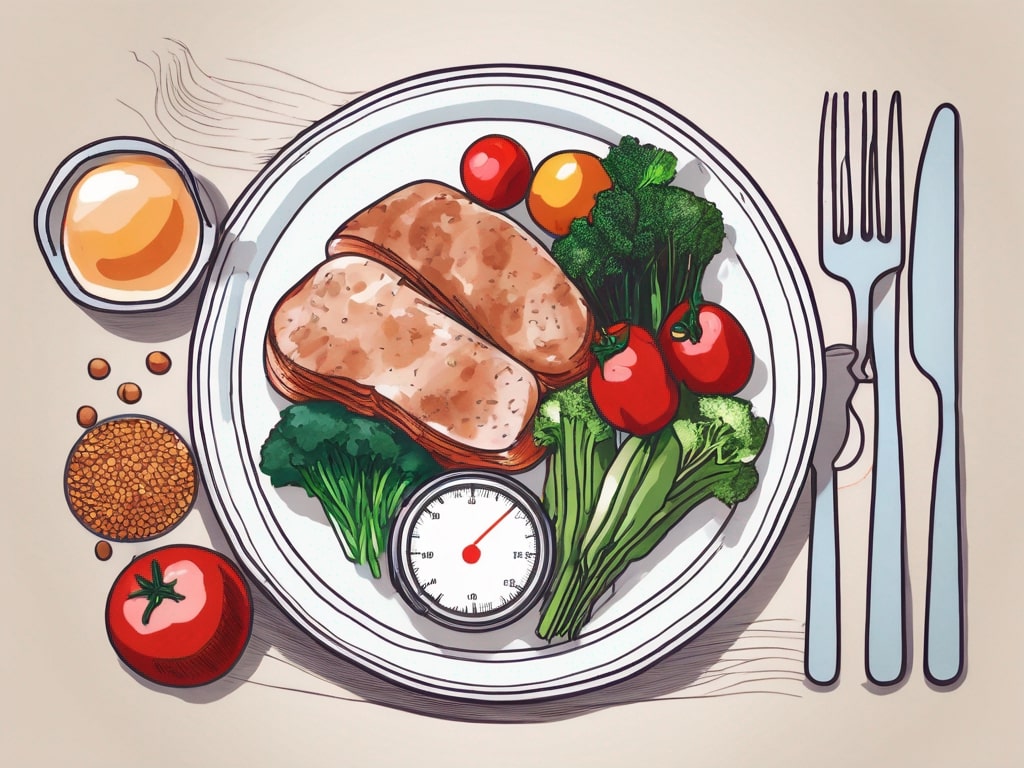Type 2 diabetes is a chronic condition characterized by high blood sugar levels and insulin resistance. It affects the body’s ability to regulate glucose, leading to various health complications. While weight gain is often discouraged for individuals with type 2 diabetes, there may be situations where gaining weight is beneficial. This article aims to provide a comprehensive guide on understanding the relationship between type 2 diabetes and weight gain, as well as practical strategies and dietary recommendations for individuals seeking to gain weight in a healthy manner.
Understanding the Link Between Type 2 Diabetes and Weight Gain
Weight gain is commonly associated with type 2 diabetes as it often occurs due to insulin resistance. When the body becomes resistant to insulin, glucose stays in the bloodstream instead of being transported into cells for energy production. As a result, the body may signal for increased insulin production, which can lead to weight gain.
In addition to insulin resistance, type 2 diabetes is also influenced by certain lifestyle factors, such as unhealthy eating habits, sedentary behavior, and genetic predisposition. These factors can contribute to weight gain and further aggravate the condition.
While weight loss is typically recommended for managing type 2 diabetes, there are instances where gaining weight may be necessary. For individuals who are underweight or experiencing unintentional weight loss, gaining weight can help improve overall health and well-being.
It is important to note that weight gain in individuals with type 2 diabetes can vary based on a multitude of factors. For example, the distribution of weight gain, such as abdominal obesity, can have different implications for insulin sensitivity and overall health. Abdominal obesity, often referred to as visceral fat, is particularly concerning as it is metabolically active and can increase the risk of cardiovascular diseases.
Moreover, the type of weight gained, whether it is lean muscle mass or adipose tissue, can also impact insulin sensitivity and metabolic health. Building lean muscle through resistance training, for instance, can improve glucose metabolism and contribute to better blood sugar control in individuals with type 2 diabetes.
How to Gain weight with type 2 diabetes?
If you have type 2 diabetes and need to gain weight, it’s crucial to approach this goal healthily. Here are some strategies that can assist you in achieving weight gain:
1. Please consult with a healthcare professional
Before embarking on any weight gain journey, it is important to consult with a healthcare professional who can provide personalized advice tailored to your unique diabetes management plan.
2. Focus on nutrient-dense foods
Instead of relying on empty calories, prioritize nutrient-dense foods that provide essential vitamins, minerals, and macronutrients. Include foods such as lean proteins, whole grains, fruits, vegetables, and healthy fats in your diet.
3. Eat frequent, balanced meals
Rather than consuming large meals infrequently, aim for smaller, more frequent meals throughout the day. This can help regulate blood sugar levels and provide a consistent source of energy.
4. Include healthy snacks
Incorporate healthy snacks between meals to increase calorie intake. Opt for snacks such as nuts, seeds, yogurt, and protein bars.
5. Monitor blood sugar levels
It is crucial to regularly monitor blood sugar levels and adjust your dietary choices accordingly. Consult with a healthcare professional to determine the appropriate macronutrient distribution and portion sizes for your specific needs.
6. Stay physically active
Engaging in regular physical activity can help build muscle mass and promote weight gain. Consult with a healthcare professional to develop an exercise plan that aligns with your diabetes management.
Gaining weight with type 2 diabetes may seem counterintuitive, as the focus is often on weight loss to improve blood sugar control. However, there are instances where weight gain is necessary, such as when an individual with diabetes is underweight or experiencing unintentional weight loss. In these cases, it is important to approach weight gain in a healthy and controlled manner.
When consulting with a healthcare professional, they will take into consideration your current health status, diabetes management plan, and any other underlying conditions you may have. They will provide guidance on the appropriate calorie intake, macronutrient distribution, and portion sizes to support weight gain without compromising blood sugar control.
One strategy to promote weight gain is to focus on nutrient-dense foods. These foods provide a higher concentration of essential nutrients per calorie, ensuring that your body receives the necessary vitamins, minerals, and macronutrients to support overall health. Lean proteins, such as chicken, fish, and tofu, can help build muscle mass. Whole grains, such as quinoa and brown rice, provide fiber and sustained energy. Fruits and vegetables offer a wide range of vitamins and minerals, while healthy fats, like avocados and olive oil, provide additional calories.
In addition to choosing nutrient-dense foods, it is important to eat frequent, balanced meals throughout the day. This approach helps regulate blood sugar levels and provides a consistent source of energy. Instead of consuming large meals infrequently, aim for smaller meals spaced evenly throughout the day. This can help prevent blood sugar spikes and crashes, ensuring a stable energy supply for your body.
Healthy snacks can also play a role in increasing calorie intake. Nuts, seeds, yogurt, and protein bars are excellent options for between-meal snacks. These snacks provide a combination of protein, healthy fats, and carbohydrates, which can help support weight gain while maintaining blood sugar control.
Monitoring blood sugar levels is crucial when trying to gain weight with type 2 diabetes. Regularly checking your blood sugar levels can help you understand how your dietary choices and portion sizes impact your blood sugar control. By working with a healthcare professional, you can determine the appropriate macronutrient distribution and portion sizes that suit your specific needs.
Lastly, staying physically active is important for overall health and can help build muscle mass, which contributes to weight gain. Engaging in regular exercise, such as strength training and cardiovascular activities, can help promote weight gain while improving insulin sensitivity. It is essential to work with a healthcare professional to develop an exercise plan that aligns with your diabetes management and takes into consideration any physical limitations or complications.
Remember, gaining weight with type 2 diabetes requires a personalized approach that considers your unique health needs. By consulting with a healthcare professional and following these strategies, you can achieve weight gain in a healthy and controlled manner.
When discussing diabetes, weight loss is often the focus—especially for those managing type 2 diabetes. However, there are situations where gaining weight is not only appropriate but necessary. Some common reasons include:
-
Being underweight or malnourished
-
Experiencing unintentional weight loss
-
Recovering from an illness, surgery, or prolonged hospitalization
-
Inadequate nutrient intake
-
Improving overall strength, immunity, and well-being
The Importance of Healthy Weight Gain in Diabetes
For people with diabetes, weight plays a significant role in managing blood sugar levels and overall health. If you’re underweight or have lost weight unintentionally, it can signal deeper health issues or nutritional deficiencies. In these cases, intentional weight gain may help:
-
Stabilize blood sugar levels
-
Improve energy levels and immune function
-
Support muscle mass and body function
However, weight gain should be done safely—with a focus on nutrient-dense foods and under the supervision of a healthcare provider. The goal isn’t to gain weight quickly, but to build healthy body mass through a balanced diet, appropriate exercise, and proper medical guidance.
Personalized Approach Matters
Weight management in diabetes isn’t one-size-fits-all. Your needs will vary based on your type of diabetes, current health condition, lifestyle, and medical history. A dietitian or doctor can help you create a personalized weight gain plan that aligns with your blood sugar goals and supports your long-term health.
Foods to Eat for Weight Gain with type 2 diabetes
When aiming to gain weight with type 2 diabetes, it is important to focus on nutrient-dense foods that provide a good balance of macronutrients and maintain blood sugar levels. Here are some examples of foods to include in your diet:
1. Lean proteins
Incorporate sources such as lean meats, poultry, fish, tofu, legumes, and dairy products into your meals.
2. Whole grains
Opt for whole grain varieties of bread, pasta, rice, and cereals, which provide essential nutrients and fiber.
3. Fruits and vegetables
Include a variety of colorful fruits and vegetables in your meals to obtain vitamins, minerals, and antioxidants.
4. Healthy fats
Incorporate foods such as avocados, nuts, seeds, and olive oil to increase your calorie intake while providing essential nutrients.
5. Dairy products
Choose low-fat or non-fat dairy products such as milk, yogurt, and cheese to increase protein and calorie intake.
6. Snacks
Incorporate healthy snacks such as nuts, dried fruits, and yogurt to increase calorie intake between meals.
Remember to monitor your blood sugar levels and adjust insulin or medication doses accordingly when incorporating these foods into your diet.
It’s also important to note that staying hydrated is crucial for overall health, especially when focusing on weight gain. Drinking an adequate amount of water throughout the day can help regulate blood sugar levels and support digestion. Additionally, incorporating beverages like herbal teas or infused water can add variety to your fluid intake while providing additional nutrients and antioxidants.
When planning your meals, consider incorporating a variety of herbs and spices to enhance the flavor of your dishes without adding extra calories. Herbs like basil, cilantro, and rosemary not only add taste but also provide potential health benefits such as anti-inflammatory properties and antioxidants. Experimenting with different seasoning blends can make your meals more enjoyable and encourage you to stick to your weight gain goals while managing type 2 diabetes.
Foods to Avoid for Weight Gain with type 2 diabetes
While it’s important to focus on nutritious foods when trying to gain weight, there are certain foods to avoid or consume in moderation to maintain blood sugar control. These include:
1. Refined carbohydrates
Limit your intake of foods such as white bread, sugary cereals, pastries, and sugary beverages as they can cause blood sugar spikes.
2. Saturated and trans fats
Reduce the consumption of foods high in saturated and trans fats, such as fried foods, fast food, processed snacks, and fatty cuts of meat.
3. Sweetened beverages: Minimize the consumption of sugary drinks like soda, fruit juices, and energy drinks as they can contribute to weight gain and blood sugar fluctuations.
4. Processed and packaged foods
Reduce the intake of processed and packaged foods, as they often contain added sugars, unhealthy fats, and high sodium levels.
It is essential to read food labels and make informed choices when grocery shopping to avoid foods that may hinder your weight gain progress and negatively impact your diabetes management.
FAQ on How to Gain weight with type 2 diabetes?
Here are some frequently asked questions regarding gaining weight with type 2 diabetes:
1. Can I gain weight while managing type 2 diabetes?
Ans. While weight loss is often recommended for managing type 2 diabetes, there are cases where gaining weight may be necessary. Consult with a healthcare professional to determine if weight gain is appropriate and how to go about it in a healthy manner that aligns with your diabetes management plan.
2. Is it safe to gain weight with type 2 diabetes?
Ans. Gaining weight with type 2 diabetes can be safe if done within a healthy range and under proper medical supervision. Consulting with a healthcare professional is crucial to ensure that your weight gain journey does not negatively impact your diabetes management and overall health.
3. What are some healthy snacks for weight gain with type 2 diabetes?
Ans. Healthy snacks for weight gain with type 2 diabetes include nuts, seeds, yogurt, protein bars, and dried fruits. These snacks provide essential nutrients and can help increase calorie intake between meals.
4. Should I exercise while trying to gain weight with type 2 diabetes?
Ans. Regular exercise is beneficial for individuals with type 2 diabetes, even during weight gain efforts. However, it is important to consult with a healthcare professional to determine the appropriate exercise plan, considering your diabetes management and overall health goals.
5. How can I ensure blood sugar control while gaining weight?
Ans. To maintain blood sugar control while gaining weight, it is crucial to monitor your blood sugar levels regularly and adjust your insulin or medication doses accordingly. Working closely with a healthcare professional can help you develop a personalized plan to incorporate weight gain strategies while maintaining optimal blood sugar levels.



